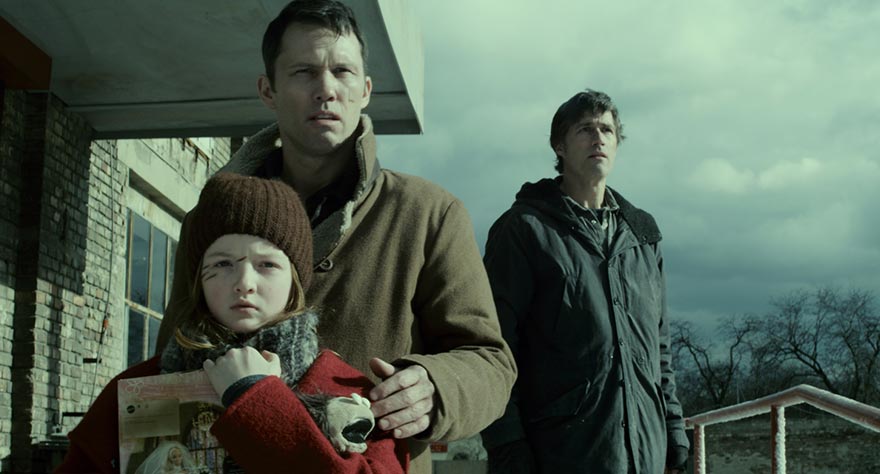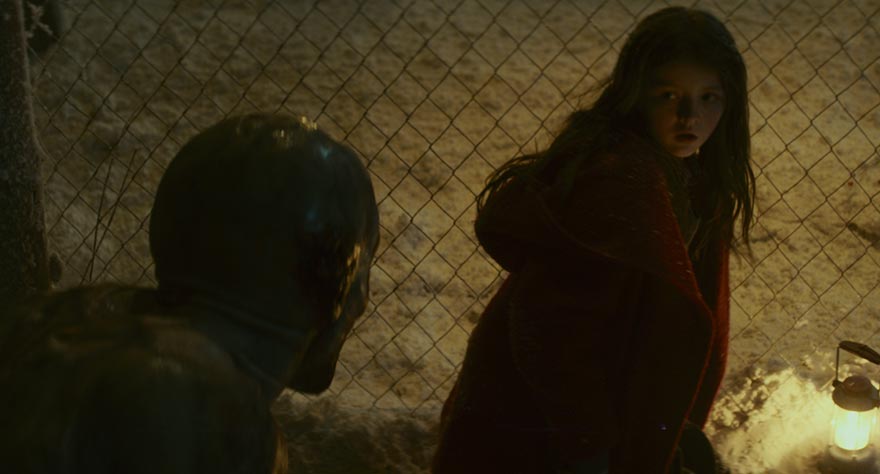
Though more creature-feature than zombie film, this relational horror film gets lost in its emotions.

Though more creature-feature than zombie film, this relational horror film gets lost in its emotions.
It sounds like an out there sitcom pitch: Two former friends with old grudges forced to live next door to one another on a country estate because the zombie apocalypse has left them as possibly the only survivors and the world has become an icy wasteland. Oh, the antics that could ensue! Arguing over property lines. Squabbles over one neighbor’s late night penchant for loud music, and even irritations about the blasted neighborhood dog. On paper, Miguel Ángel Vivas’s Extinction technically fits this silly description, but considering the very serious tone of the film, he clearly decided not to veer toward a laugh track and instead play this one straight. Except it’s just a little too hard to swallow, and in the sludge of its seriousness, Extinction is sorely lacking in any relief of tension.
Starring a ruggedly long-haired Matthew Fox as Patrick, and a deliberately contrasted and clean-cut Jeffrey Donovan as Jack, the film opens at the start of a zombie-style epidemic. Short-haired Patrick, Jack, and their shared love interest, Emma, are on a bus headed to some sort of military safe zone. Emma has a small baby in her arms, and when the bus is suddenly stopped due to troubles outside, she does her best to keep the child calm. Vivas doesn’t delve too deeply into the origins of the infected, but it becomes apparent that once bitten these people turn quickly and are fiercely aggressive. When the obtuse military men exit the bus to scope out the situation they quickly fall victim and the entire bus goes into a panic. Patrick, Jack and Emma escape but not without injury. Emma is bitten and Patrick has to chop off her arm to save her.
Flash forward to the present where Patrick has adopted his long-haired look and snowmobiles around New York City hunting food. Back at the country homestead in the kitschily titled town of Harmony, Patrick lives next door to Jack and Lu (Quinn McColgan), the now 9-year old child Emma once protected. With no sign of Emma, it’s not hard to guess the source of the animosity that separates Jack and Patrick. They live in their houses, several layers of chain-link fence dividing them. Patrick likes to get drunk with his dog and nightly broadcasts through the radio searching for any other survivors. Jack maintains a strict household with Lu, playing the dutiful father determined to give his daughter as close to a normal human upbringing as possible. Her television time is limited—she watches old cartoons powered by their gas generator—and her studies encouraged, but she’s of a curious age and her questions about the world get increasingly more complicated. Especially as they relate to her curiosity in Patrick and her love of his dog.
But Extinction can’t seem to decide where it would like the meat of its content to lie, so almost as soon as the relational dynamics get interesting, the focus pivots and turns to the outside world where the infected humans have apparently not all died off due to the cold, but instead adapted. Forget that science tells us true evolutionary adaptation takes hundreds of thousands of years, in this version of the world it takes about 10 years. Which Patrick discovers when out hunting one day. He encounters an all white, blind, and sharp-toothed version of the zombies he encountered years before. Somehow the creatures have evolved to live in the intense cold and for whatever reason decided they didn’t need sight but use sound to hunt instead. Oh, and they have nasty little mouths that have developed on the sides of their heads with extra teeth and the ability to communicate.

Of course, these monsters are terrifying to behold, but Vivas makes a distinct beeline toward creature-feature by deciding not to take advantage of the inherent horror in the human-ness of zombies (though he is working with the content from Juan de Dios Garduño’s novel Y pese a todo…, which likely elaborates on the creatures origins more). The film then goes on to parry back and forth awkwardly between this new and violent threat and Lu’s innocent and child-like efforts to reunite Jack and Patrick as friends. The introduction of a new survivor provides a new hope for the larger picture of humanity, but Jack and Patrick have hardly a moment to argue over the sanity of staying put versus finding others when they are attacked by a slew of creatures. All of which leads to a predictable ending and a sincere lack of emotional reconciliation.
Fox and Donovan are both accomplished actors and play their part with as much sincerity as they can muster, but Vivas uses McColgan and her bright little smile to provide the only bit of warmth to this cold film. I’m open to childlike manipulation as much as the next person, and her sway on the characters is endearing, but she becomes a pawn in the film’s tawdry plot development. The most obvious sign of Vivas’s attempts to add gravitas to a predictable thriller is in the almost comically over-animated CG sunsets glittering off the white snow-covered hillsides of the film’s setting. The sun appears to be ten times its normal size—which, if true, would scientifically mean this world would be warmer not colder—and reminded me, maybe because of the farm setting, of The Wizard of Oz. But for all its attempts to take us through the necessity of human connection, the bonds formed in the film feel as fleeting and forced as the character’s delusions of safety.
Heavy-handed in both its horror elements and its emotions, Extinction ends up lacking in both real frights and real attachments.